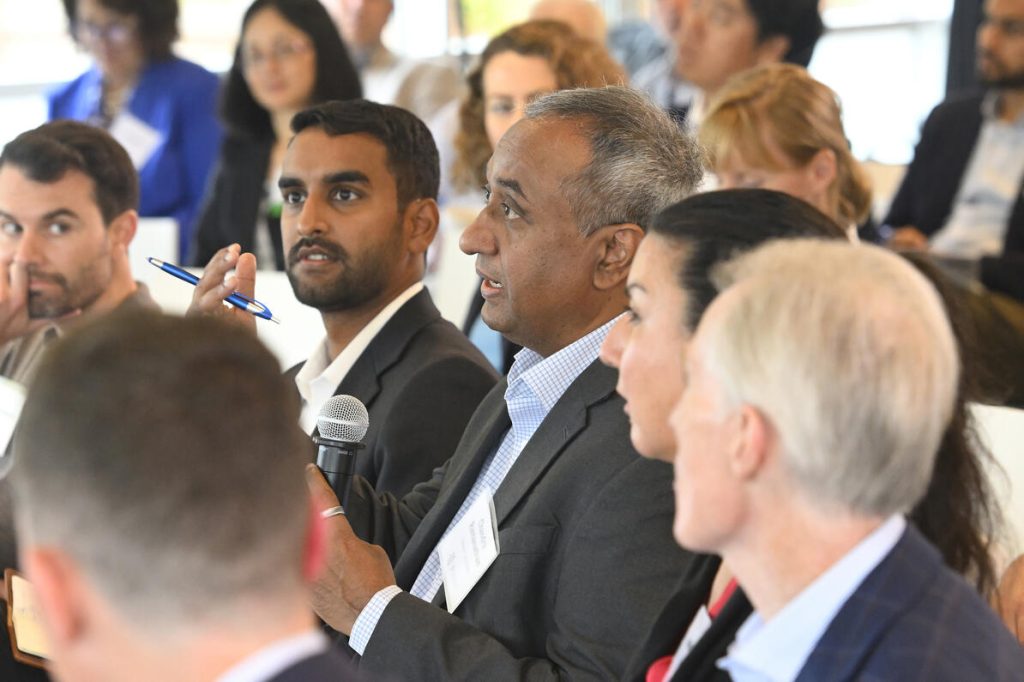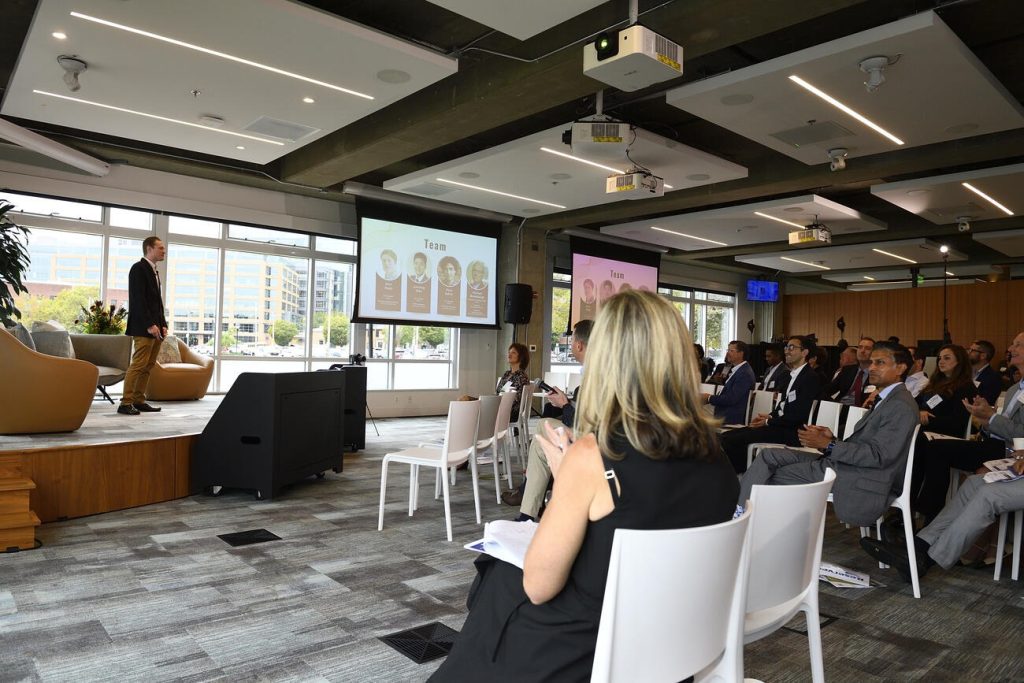
When Bailey Surtees graduated in 2017 from Johns Hopkins University with a bachelor’s degree in biomedical engineering, the Oklahoma City native embarked on turning her senior research project into a viable company that marries cryotherapy with veterinarian medicine.
Three years later, with the help of Johns Hopkins Technology Ventures (JHTV), Surtees became the co-founder and chief executive officer of Kubanda Cryotherapy—a company that uses a cryogenic technology that she and her co-founder, Clarisse Hu, Engr ’17, ’19 (MS), developed at Hopkins to deliver affordable, in-clinic treatments for “lumps, bumps, and tumors” on pets.
On a recent afternoon in Baltimore, Surtees pitched their company to dozens of investors who gathered for Johns Hopkins’ inaugural Innovation Summit, organized by JHTV, the Carey Business School, the Department of Biomedical Engineering, PTX Capital, and a local nonprofit research institute, Blackbird Laboratories.
“We spun out of Johns Hopkins in 2020,” Surtees said on a Brown Advisory stage set against glimmering waterfront views of the Inner Harbor. “We’re in the home stretch of a $1.6 million seed round to allow us to scale to 100 clinics, refine our manufacturing for volume, and deploy accredited training programs with a focus on veterinarian schools and corporate trainings.”
Once the company establishes a profitable operation in the “beachhead” veterinarian market, it intends to expand into the low-cost breast cancer cryoablation treatments the team first developed in South Africa. Kubanda means “ice” in Zulu.
The trajectory of Surtees and Hu, who also graduated from Hopkins with a bachelor’s degree in biomedical engineering and a master’s in engineering, is precisely the type of success story that Johns Hopkins Technology Ventures envisioned when it formed a decade ago.

From left, Patrick Malone, KdT Ventures; Abi Kulshreshtha, TEDCO MII; Chandra Ramanathan, Danaher (speaking); Misti Ushio, Digitalis; Mark Kolb, Tech Council Ventures
Thanks to the work of JHTV, Johns Hopkins University prominently appeared on the inaugural list of 50 Ignition Schools established by Inc. and Fast Company magazines. The list celebrates universities whose technology transfer programs are “making an outsize impact on business and society through entrepreneurship and innovation,” according to the magazines.
The Fast Company article, “Johns Hopkins Technology Ventures proves you don’t need to move to a tech hub. Just build your own,” credits Johns Hopkins for providing a roadmap for how universities can build their own tech hubs, and the Inc. article, “How Johns Hopkins Became a Stealth Entrepreneurship Hub,” details how Hopkins “spent a decade developing its entrepreneurial ecosystem.”
Ten years ago, Johns Hopkins was among the first of its peer institutions to consolidate technology transfer, corporate research collaborations, and venture creation under one division: Johns Hopkins Technology Ventures.
Industry is increasingly relying on academia to feed R&D pipelines. By establishing a single front door for campus researchers and outside investors, JHTV has provided a highly coordinated support structure for developing start-up companies, securing corporate licensing of patented research, and fostering partnerships between companies and scientists to bring products to market.
An uptick in annual licensing revenue is just one outcome of this successful strategy. In the five years prior to JHTV’s creation in fiscal year 2015, average annual licensing revenue stood at $15.5 million. Over the next five years, the average jumped to $36.6 million. And for the past decade, average annual revenue has stood at $39 million. The revenue stems from 4,018 total active patents and thousands of licensed technologies (with more than 1,900 more available for licensing).
Johns Hopkins has incubated a robust startup ecosystem by introducing a range of startup support services, including physical incubation space, educational programs, accelerators, mentorship, and venture fundraising support. As a result, in the last decade, 43 Johns Hopkins startups have “exited,” whether via initial public offerings of stock or via mergers and acquisitions. This reflects a significant uptick in the portfolio’s exit activity since JHTV was formed; only 11 startup exits occurred in the entire prior history of Johns Hopkins.

Kent Rapp on stage pitching Biolinco
Innovative technologies and startup companies come from many corners and innovator populations on campus, whether undergraduate and master’s students like the Kubanda team, doctoral students like Kelvin Liu, founder of Circulomics, and clinician researchers like Therese Canares Bus ’21 (MPH/MBA), founder of CurieDX.
Circulomics is a genomics company specializing in sequencing sample preparation products that have enabled high-impact genomics projects such as the Human Pangenome Project and Darwin Tree of Life. The company, founded by a Johns Hopkins doctoral student from Professor Jeff Wang’s laboratory, was acquired in 2021 by Pacific Biosciences, a publicly traded company. CurieDX is developing a remote virtual diagnostic tool for almost instant diagnosis of strep throat using a smartphone app, with six more diagnostics in development for common diseases. Founded by a Johns Hopkins alum who is pediatric emergency medicine physician and a computer scientist, the company is onboarding its first customers this year.
“This work of academic translation and company building is not for the faint of heart,” says Christy Wyskiel, JHTV executive director and senior adviser for innovation and entrepreneurship to Johns Hopkins University President Ron Daniels. “Our innovators wear many hats and must juggle many competing priorities. Our goal is to facilitate and equip inventors to maximize the chance of seeing translational outcomes. We have come a long way in supporting Johns Hopkins entrepreneurs, and we are seeing the results of our investment grow every year.”
Some inventors do not pursue a startup company but rather work with Johns Hopkins Technology Ventures to license their work to establish industry players. Such corporate licensing successes that have resulted in both impactful products on the market and meaningful institutional revenue—fueling a virtuous cycle of innovation—include:
- Pylarify: The diagnostic is the market leader for prostate cancer imaging via PET scan and is estimated to have been used in over 250,000 patient scans so far this year. Sales are expected to reach $1 billion in 2024.
- Vorasidenib: This therapy that was recently approved by the U.S. Food and Drug Administration (FDA) treats low grade ID-mutant glioma, the most common malignant primary brain tumor in adults. This new standard of care is expected to meaningfully delay the need for radiation and chemotherapy.
- Relatlimab: In 2022, the FDA approved a combination therapy for metastatic or inoperable melanoma, an aggressive type of skin cancer, involving relatlimab (anti-LAG-3) and nivolumab (anti-PD-1). The anti-tumor effects of LAG-3 blockade were discovered at Johns Hopkins’ cancer center.
The Innovation Summit on Sept. 26 brought the various players from across the entrepreneurial ecosystem into one room at Brown Advisory’s office in Fells Point. Fourteen Johns Hopkins innovator teams were featured, including Benjamin Larman, an associate professor of pathology at the Johns Hopkins School of Medicine and founder of Infinity Bio. The company’s technology spun out last year from the Larman Laboratory in the immunology division of the medical school’s pathology department.
The company’s core technology comprehensively measures antibody reactivities against all known human viruses, human proteins (autoimmunity), and allergen proteins. Infinity Bio has received $4.5 million in financing from PTX Capital, a Baltimore-based investment company and co-sponsor of the Innovation Summit. Just a year after launch, from a new Baltimore lab facility, Infinity Bio is already serving clients and generating revenue.
The event also featured fellow Hopkins doctoral candidates, Kent Rapp and Kevin Wen, who pitched their startup, Biolinco, which provides state-of-the-art technology to find the best cell lines for faster, more affordable drug manufacturing. Rapp, who recently completed his doctorate, and Wen both work in the lab of Michael Betenbaugh, a Johns Hopkins professor of chemical and biomolecular engineering and lead principal investigator of the Advanced Mammalian Biomanufacturing Innovation Center at the Whiting School of Engineering.
Their company is just getting started, relying on the intersection of support JHTV has fostered over the past 10 years, including via the National Science Foundation’s I-Corps Program and an accelerator run out of JHTV’s Pava Marie LaPere Center for Entrepreneurship.
“To date we have received more than $300,000,” Rapp said. “In 2026 we expect to obtain our first sponsored user contract or pilot user contract with the goal of full commercialization in 2027 and beyond.”
Dennis Wirtz, vice provost for research, hailed such optimistic verve fostered by JHTV and the students and faculty who engage in commercializing their discoveries.
“Johns Hopkins’ research tradition dates back 150 years and is widely known,” Wirtz said. “Less known, but increasingly visible, is the entrepreneurial spirit across campus and the accumulation of translational successes that began first as research projects. It is a privilege to watch the diversity of entrepreneurial endeavors gain support and traction from JHTV and the broader, growing ecosystem.”